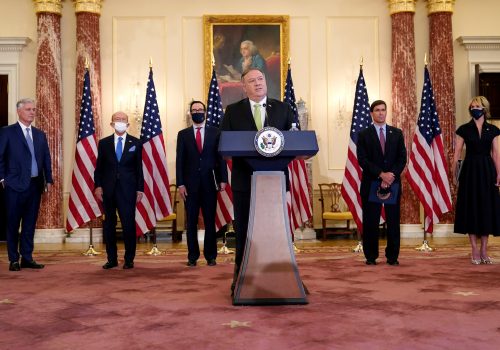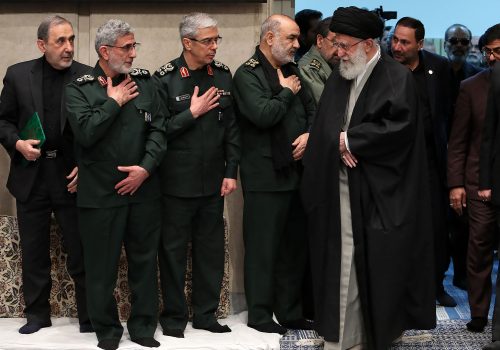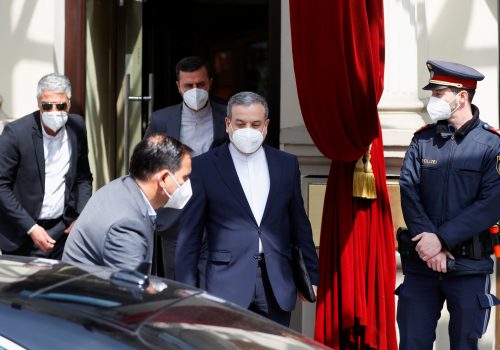Iran is playing musical chairs with leadership positions. None of these individuals have been sanctioned.
Iran’s Supreme National Security Council (SNSC) has a new secretary. After nearly a decade at the helm, Rear Admiral Ali Shamkhani stepped down from the SNSC on May 22 and was appointed to the Expediency and Discernment Council, a hybrid advisory and legislative body. Not surprisingly, Shamkhani’s replacement, Rear Admiral Ali Akbar Ahmadian, is another Islamic Revolutionary Guard Corps (IRGC) member and Iran-Iraq War veteran.
Playing musical chairs with leadership positions like this provides Washington with opportunities to recalibrate and update its coercive economic measures, with the goal of punishing targets for past bad behavior in order to deter such behavior in the future. Ahmadian is already subject to US and international sanctions. However, there are other areas where the Joe Biden administration can levy targeted penalties against recently appointed but undesignated leaders of already sanctioned institutions in Iran.
The US Treasury has a history of blacklisting leaders for sanctions circumvention and terror finance. This practice should not stop, given that corrupt business practices on behalf of sanctions-busters, which are aimed at handicapping due-diligence efforts—by operating shell companies and fronts, changing company names, or transferring ownership—are also not stopping.
Unless there is a fundamental change of mission, something improbable in the Islamic Republic today, newly appointed individuals will be helping designated organizations further carry out sanctionable activities by simply showing up for work. Moreover, Tehran can use the introduction of fresh leadership to falsely suggest that their organizations are no longer conducting sanctionable activity, which is aimed at tricking the marketplace.
For Washington, holding such leaders accountable can help improve its position in what is likened to a perennial game of “whack-a-mole.” Beyond exercising good sanctions hygiene and keeping its targeting up to date, the move offers Washington several advantages.
First, it better allows the US to credibly signal that it has the capability and intent to enforce older sanctions, as long as a behavioral predicate for each penalty exists. Second, it allows Washington to incentivize prospective leadership candidates to self-select out of contention, as they might want to avoid being subject to restrictive or coercive measures, such as an asset freeze or travel prohibitions. Third, it offers the long-term possibility of bolstering the deterrent aspect of sanctions rather than its punitive side, which enables sanctions to be better leveraged as a threat in crisis bargaining or coercive diplomacy scenarios. Lastly, there is the economic impact, which, admittedly, is likely to be limited when applied to the individual. Nevertheless, it raises the risks of sanctions exposure for foreign financial institutions that may knowingly deal with such individuals.
Luckily for the Biden administration, they can take advantage of all of these benefits by targeting several low-hanging fruit.
For example, early this May, the IRGC’s engineering arm, known as Khatam al-Anbiya (KAA) construction headquarters—a massive economic conglomerate founded in 1989 linked to the IRGC—experienced a leadership shake-up. Following only a two-year stint, Hossein Housh Al-Sadat was removed from the governance of KAA on May 1 and replaced by Brigadier General Abdolreza Abed.
Washington last designated the head of KAA in 2010, when IRGC Brigadier General Rostam Qassemi led the organization. Since then, KAA has remained on the Treasury Department’s sanctions lists, subject to counter-proliferation and counter-terrorism penalties. Since Qassemi departed from KAA in 2011, multiple US administrations have missed the chance to target successive heads of the organization, rendering the likes of Abolqasem Mozafari-Shams, Ebadallah Abdollahi, Saeed Mohammad, and Hossein Housh Al-Sadat sanctions free. President Biden should not miss an opportunity to hold Abed, the latest in a line of IRGC-linked KAA chiefs, accountable.
Additionally, the Biden administration has yet to blacklist new industry leaders helping Iran illicitly sell its oil.
In September 2021, Iran’s energy minister appointed Mohsen Khojasteh-Mehr as the new managing director of the National Iranian Oil Company (NIOC). Khojasteh-Mehr previously served as deputy minister for planning in the Iranian oil ministry and had a leadership position in the sanctioned Tadbir Drilling Development Company, a subsidiary of a larger business network tied to Supreme Leader Ali Khamenei.
Khojasteh-Mehr replaced Masoud Karbasian, who held the position since 2018. Karbasian was sanctioned by counter-terrorism authorities in 2020 for his leadership role in NIOC, which was assessed to be supporting the activities of Iran’s IRGC Quds-Force through illicit oil sales.
While NIOC was initially sanctioned by Washington in 2012 and determined to be “an agent or affiliate” of the IRGC, NIOC received limited economic relief under the 2015 Iran nuclear deal. In 2020, the NIOC was sanctioned in its entirety under an updated counter-terrorism authority by the Donald Trump administration.
Similarly, the Treasury Department noted in 2020 that the NIOC and the National Iranian Tanker Company (NITC) sold oil and tankers on behalf of the IRGC Quds Force, and that the NITC’s managing director had worked with Lebanese Hezbollah on delivering oil shipments to Syria. NITC and its then-head, Nasrollah Sardashti, were accordingly sanctioned under the same expanded counter-terrorism authority used by the Trump administration to target NIOC and Karbasian.
Fast forward to 2021, only two months after playing musical chairs at NIOC, Iran re-arranged the deck at NITC by swapping out Sardashti for Hossein Shiva as managing director of the National Iranian Tanker Company. Shiva previously served as deputy managing director of NITC, an oil ministry advisor, and secretary of an SNSC subcommittee on economics. To date, Shiva, like Khojasteh-Mehr, has not been designated.
Together, Khojasteh-Mehr, Shiva, and Abed function as essentially un-restricted agents of sanctioned institutions. While targeting this trio—or any other penalty-free actors in Tehran—is unlikely to yield the immediate results needed to crack down on Iran’s illicit oil exports, it would signal that Washington is willing to spend the requisite time and resources to better calibrate its sanctions based on fast-changing facts on the ground.
Beyond the potential deterrent dividends of the move, holding these leaders accountable makes US sanctions policy look more coherent. Furthermore, it would combat the narrative that a more permissive business environment is being fostered within the Islamic Republic—a sentiment regime elites like Khojasteh-Mehr, Shiva, and Abed are likely keen to foster and exploit.
Behnam Ben Taleblu is a senior fellow at the Foundation for Defense of Democracies (FDD) in Washington DC, where he contributes to its Iran Program and Center on Economic and Financial Power (CEFP).
The views expressed are his own.
Further reading
Wed, Sep 23, 2020
After snapback sanctions on Iran: A European perspective
IranSource By Michel Duclos
As seen from Europe, which has its own continuing embargo on arms transfers to Iran through 2023, the Trump administration will likely not insist on imposing its "parallel reality" on reluctant allies.
Thu, Feb 11, 2021
Analyzing terrorism sanctions on Iran and the path forward
IranSource By
The de-listing of Iranian economic entities that were designated as terrorist entities could spark a broader debate on the overarching US approach to Iranian support for regional armed factions.
Fri, Apr 23, 2021
‘Poison pill sanctions’ are hard for Vienna negotiators to swallow
IranSource By Brian O’Toole
“Poison pill sanctions,” a large list of sanctions that would have been allowed under the 2015 nuclear accord, are clearly the sticking point in the ongoing negotiations and the focus of the technical working groups in Vienna.
Image: Iran's Secretary of the Supreme National Security Council Ali Akbar Ahmadian meets with Iraq's National Security Advisor Qasim al-Araji in Tehran, Iran, May 29, 2023. WANA (West Asia News Agency) via REUTERS


